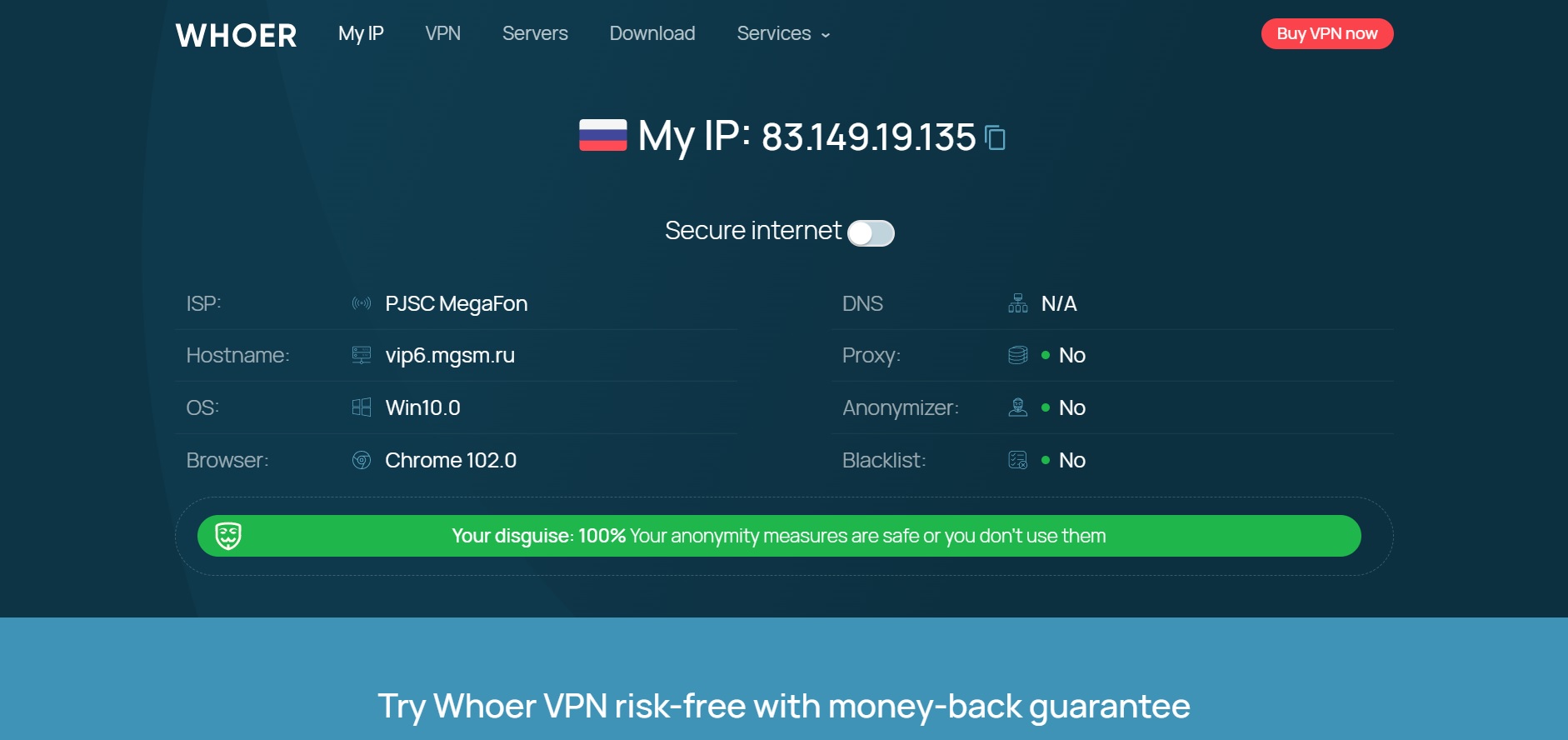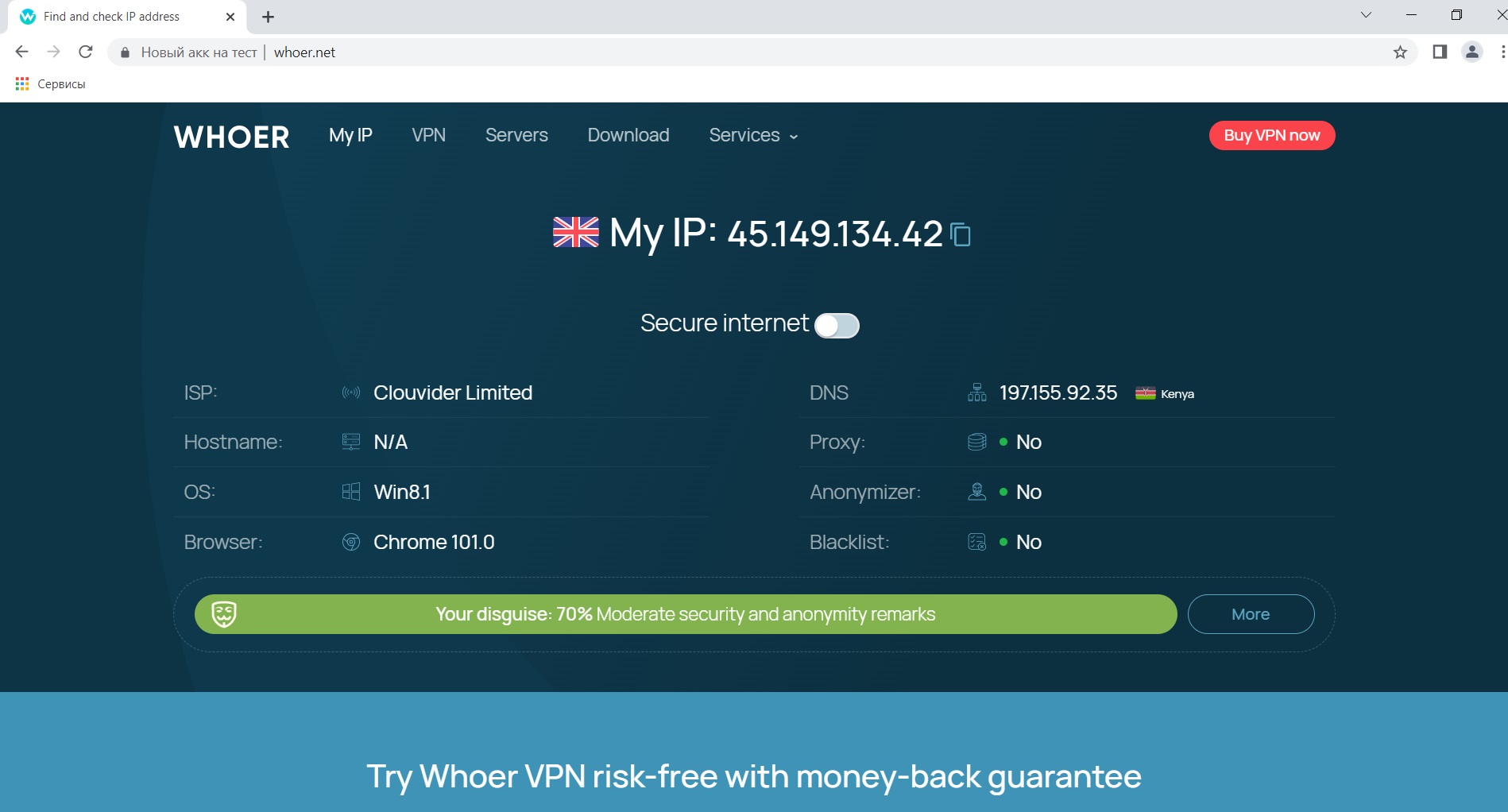Lord777
Professional
- Messages
- 2,576
- Reaction score
- 1,551
- Points
- 113
The beginning of spring 2023 was marked by a new wave of discussions: Russian supervisory authorities are about to block all VPNs. In reality, it's not that bad. In this article, we will tell you whether all VPNs can be blocked, what to do in case of blocking, and what can be used as a replacement.
For example, in Russia there is a law prohibiting circumventing the blocking of various sites and resources. Since one of the functions of a VPN is to give access to blocked or banned sites, it is clear why the state is trying to restrict the operation of such services.
If we are talking about a local crash, the problem can be resolved within a couple of hours. Moreover, in some cases, the support service may recommend settings inside the VPN itself that will help you resume working.
If the service confirms that there are external obstacles to operation, go to step 3.
To do this, you can buy access to another VPN or use alternative software. For example, a combination of an anti-detect browser and a proxy is often used as a replacement. We'll talk about anti-detections below.
At the same time, you should not rush to completely abandon your VPN and demand compensation. The fact is that in fact, the supervisory authorities do not block the services themselves, but specific IP addresses or data transfer protocols. This means that over time, the VPN service can pick up new data or it already has it — you just need to contact the service.
There are several reasons for this:
Anti-detect browsers are special programs that change the data of your computer, provider, and browser. This data is called a fingerprint or digital fingerprint.
If you visit sites but do not change your digital fingerprints, the algorithms of the resources you visit can see and collect data about you: who are you, where are you from, what device are you using, what operating system do you have, how much RAM does the device have, what resolution does your screen have, and so on.
There are dozens of such parameters, and together they form a combination of fingerprint data.
In the future, this data may be used to identify you. Even if you don't log in to the site, based on a combination of depersonalized parameters, sites will be able to pin data to you and recognize you. As a rule, a standard fingerprint can occur once in thousands or millions of other prints, depending on the combination of parameters.
If you change your digital fingerprints, sites will see the data that you set up yourself or that the browser offers you.
For the test, we decided to check the data through one of the most famous fingerprint scanners — Whoer.net. For example, here are the parameters of a device where the digital fingerprint does not change:

And this is what the fingerprint parameters look like through the anti-detection Dolphin browser{anty}:

Interestingly, a combination of proxy and VPN was used through anti-detection, but the site did not see the use of a proxy. If you delve deeper into the anti-detection settings, you can make your fingerprints even more similar to the data of a regular user.
For example, our anti — detection browser Dolphin{anty} is currently gaining popularity among users. As a rule, users note a high level of data substitution, a clear interface, functions for automating work, fast import and export, and, yes, the ability to admit their mistakes and solve problems.
Alas, as much as we would like, but so far anti-detection can not replace VPN.
How browser anti-detection is inferior to VPN
There are two key points on which anti-detection browsers are inferior to VPNs:
At the same time, the simultaneous use of an anti-detection browser along with a VPN and proxy will make your connection as secure and fast as possible, while helping you solve almost any network tasks.
To check the browser's anti-detection feature, use the free Dolphin{anty} tariff. Setting up Dolphin{anty} is easy, but if you have any difficulties, you can view our instructions for setting up the browser.
Why do they block VPNs at all?
The key reason for restrictions is that a VPN gives you access to resources, sites, or information that are prohibited in a particular territory or state.For example, in Russia there is a law prohibiting circumventing the blocking of various sites and resources. Since one of the functions of a VPN is to give access to blocked or banned sites, it is clear why the state is trying to restrict the operation of such services.
What should I do if my VPN is blocked?
The procedure largely depends on the reason why there are difficulties connecting to your VPN.Step 1. Understand what the problems are related to
For example, the reason may be:- Failure on the side of the telecom operator or provider. In this case, you just need to wait for some time and the connection will be restored;
- Temporary failures on the side of the VPN service itself;
- The service is blocked by Russian agencies.
Step 2. Contact Support
Potential problems with blockages and connections are another confirmation of why it is important to choose services and products with good customer support. If you contact us, our specialists will be able to tell you what the problem is and suggest a solution.If we are talking about a local crash, the problem can be resolved within a couple of hours. Moreover, in some cases, the support service may recommend settings inside the VPN itself that will help you resume working.
If the service confirms that there are external obstacles to operation, go to step 3.
Step 3. Choose an alternative service
If there are problems with your VPN service and you don't have time to wait, choose an alternative way to log in to the network.To do this, you can buy access to another VPN or use alternative software. For example, a combination of an anti-detect browser and a proxy is often used as a replacement. We'll talk about anti-detections below.
At the same time, you should not rush to completely abandon your VPN and demand compensation. The fact is that in fact, the supervisory authorities do not block the services themselves, but specific IP addresses or data transfer protocols. This means that over time, the VPN service can pick up new data or it already has it — you just need to contact the service.
Can all VPNs be blocked?
Despite the loud headlines in the media, a complete lockdown is rather impossible.There are several reasons for this:
- There are a lot of VPN services. To find all VPNs and their data, you will have to spend a lot of time. At the same time, since blocking is not the first time and VPN services are basically ready for such measures, as long as the state tries to block one service or its protocols, others will appear in its place.;
- Difficulty of blocking. Generally, there are two key methods: blocking by IP address and blocking by protocol. And although blocking the protocol is faster, in fact there are some data transfer protocols that are difficult to identify in principle.
- VPNs are necessary for data security, so a complete ban on them would deprive users of the possibility of additional protection.
How can I replace a VPN?
As we wrote above, if you block a VPN, you can use anti-detect browsers.Anti-detect browsers are special programs that change the data of your computer, provider, and browser. This data is called a fingerprint or digital fingerprint.
If you visit sites but do not change your digital fingerprints, the algorithms of the resources you visit can see and collect data about you: who are you, where are you from, what device are you using, what operating system do you have, how much RAM does the device have, what resolution does your screen have, and so on.
There are dozens of such parameters, and together they form a combination of fingerprint data.
In the future, this data may be used to identify you. Even if you don't log in to the site, based on a combination of depersonalized parameters, sites will be able to pin data to you and recognize you. As a rule, a standard fingerprint can occur once in thousands or millions of other prints, depending on the combination of parameters.
If you change your digital fingerprints, sites will see the data that you set up yourself or that the browser offers you.
For the test, we decided to check the data through one of the most famous fingerprint scanners — Whoer.net. For example, here are the parameters of a device where the digital fingerprint does not change:

And this is what the fingerprint parameters look like through the anti-detection Dolphin browser{anty}:

Interestingly, a combination of proxy and VPN was used through anti-detection, but the site did not see the use of a proxy. If you delve deeper into the anti-detection settings, you can make your fingerprints even more similar to the data of a regular user.
Why is an anti-detection browser better than a VPN?
Using the browser's anti-detect feature, you can:- Become like any other regular user. This is due to the fact that anti-detection replaces your real data with other data, while the VPN encrypts it;
- Work simultaneously on the same site and device, and in different accounts. Or vice versa — different team members can simultaneously work in the same account from different devices;
- Features to speed up the network: automatic import and export of data to the browser, convenient operation of accounts, compatibility with different proxies, etc.
- Automate data. If the browser has an open API, you can connect other applications or your own scripts to it to perform actions on the network automatically.
For example, our anti — detection browser Dolphin{anty} is currently gaining popularity among users. As a rule, users note a high level of data substitution, a clear interface, functions for automating work, fast import and export, and, yes, the ability to admit their mistakes and solve problems.
Alas, as much as we would like, but so far anti-detection can not replace VPN.
How browser anti-detection is inferior to VPN
There are two key points on which anti-detection browsers are inferior to VPNs:- Anti-detection the browser does not encrypt traffic. These programs protect your data, but they don't protect what you do online. On the one hand, it helps you be as much like a regular user as possible. On the other hand, it may not be suitable for those who need anonymity.
- The anti-detection itself does not change your IP address. To do this, you need to additionally use a proxy or the same VPN.
At the same time, the simultaneous use of an anti-detection browser along with a VPN and proxy will make your connection as secure and fast as possible, while helping you solve almost any network tasks.
To check the browser's anti-detection feature, use the free Dolphin{anty} tariff. Setting up Dolphin{anty} is easy, but if you have any difficulties, you can view our instructions for setting up the browser.
Last edited by a moderator:

